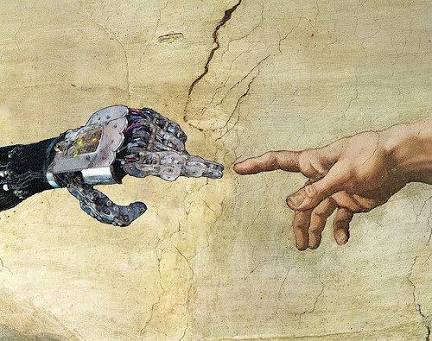As I discussed in digital immortality that longevity is possible by integrating human and computers or machines in virtual environment of consignees this phenomenon is called technical singularity. It is a broad hypothesis wich open a door of imagination for researcher and scientist for a future where no one dei.
According to this hypothesis, an upgradable intelligent agent (such as a computer running software-based artificial general intelligence) would enter a "runaway reaction" of self-improvement cycles, with each new and more intelligent generation appearing more and more rapidly, causing an intelligence explosion and resulting in a powerful superintelligence that would, qualitatively, far surpass all human intelligence. John von Neumann first used the term "singularity" (c. 1950s), in the context of technological progress causing accelerating change: "The accelerating progress of technology and changes in the mode of human life, give the appearance of approaching some essential singularity in the history of the race beyond which human affairs, as we know them, could not continue". Subsequent authors have echoed this viewpoint. I. J. Good's "intelligence explosion" model predicts that a future superintelligence will trigger a singularity.[6] Emeritus professor of computer science at San Diego State University and science fiction author Vernor Vinge said in his 1993 essay The Coming Technological Singularity that this would signal the end of the human era, as the new superintelligence would continue to upgrade itself and would advance technologically at an incomprehensible rate.
At the 2012 Singularity Summit, Stuart Armstrong did a study of artificial general intelligence (AGI) predictions by experts and found a wide range of predicted dates, with a median value of 2040.
Many notable personalities, including Stephen Hawking and Elon Musk consider the uncontrolled rise of artificial intelligence as a matter of alarm and concern for humanity's future. The consequences of the singularity and its potential benefit or harm to the human race have been hotly debated by various intellectual circles.
Source - wikipedia
According to this hypothesis, an upgradable intelligent agent (such as a computer running software-based artificial general intelligence) would enter a "runaway reaction" of self-improvement cycles, with each new and more intelligent generation appearing more and more rapidly, causing an intelligence explosion and resulting in a powerful superintelligence that would, qualitatively, far surpass all human intelligence. John von Neumann first used the term "singularity" (c. 1950s), in the context of technological progress causing accelerating change: "The accelerating progress of technology and changes in the mode of human life, give the appearance of approaching some essential singularity in the history of the race beyond which human affairs, as we know them, could not continue". Subsequent authors have echoed this viewpoint. I. J. Good's "intelligence explosion" model predicts that a future superintelligence will trigger a singularity.[6] Emeritus professor of computer science at San Diego State University and science fiction author Vernor Vinge said in his 1993 essay The Coming Technological Singularity that this would signal the end of the human era, as the new superintelligence would continue to upgrade itself and would advance technologically at an incomprehensible rate.
At the 2012 Singularity Summit, Stuart Armstrong did a study of artificial general intelligence (AGI) predictions by experts and found a wide range of predicted dates, with a median value of 2040.
Many notable personalities, including Stephen Hawking and Elon Musk consider the uncontrolled rise of artificial intelligence as a matter of alarm and concern for humanity's future. The consequences of the singularity and its potential benefit or harm to the human race have been hotly debated by various intellectual circles.
Source - wikipedia

No comments:
Post a Comment